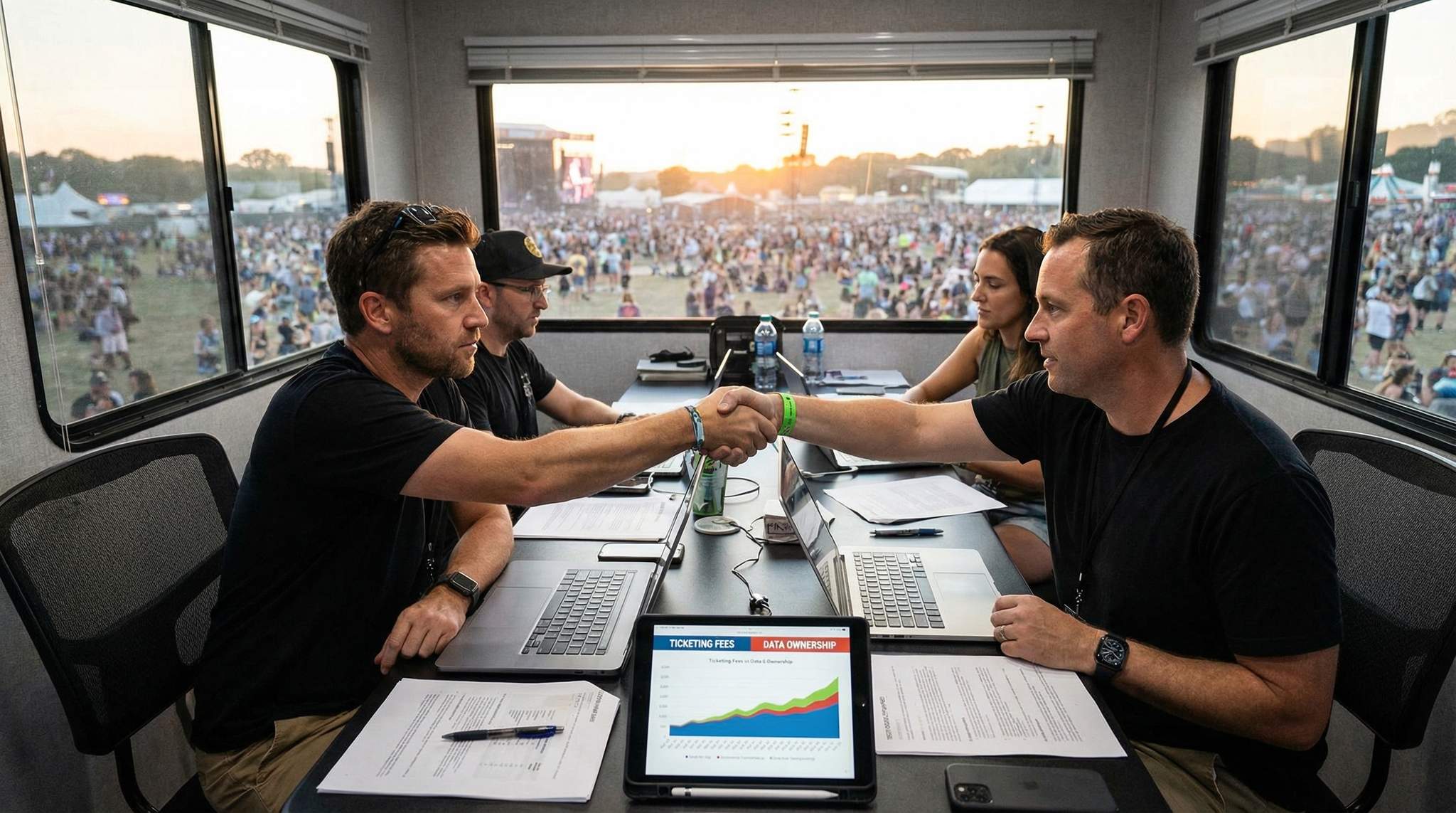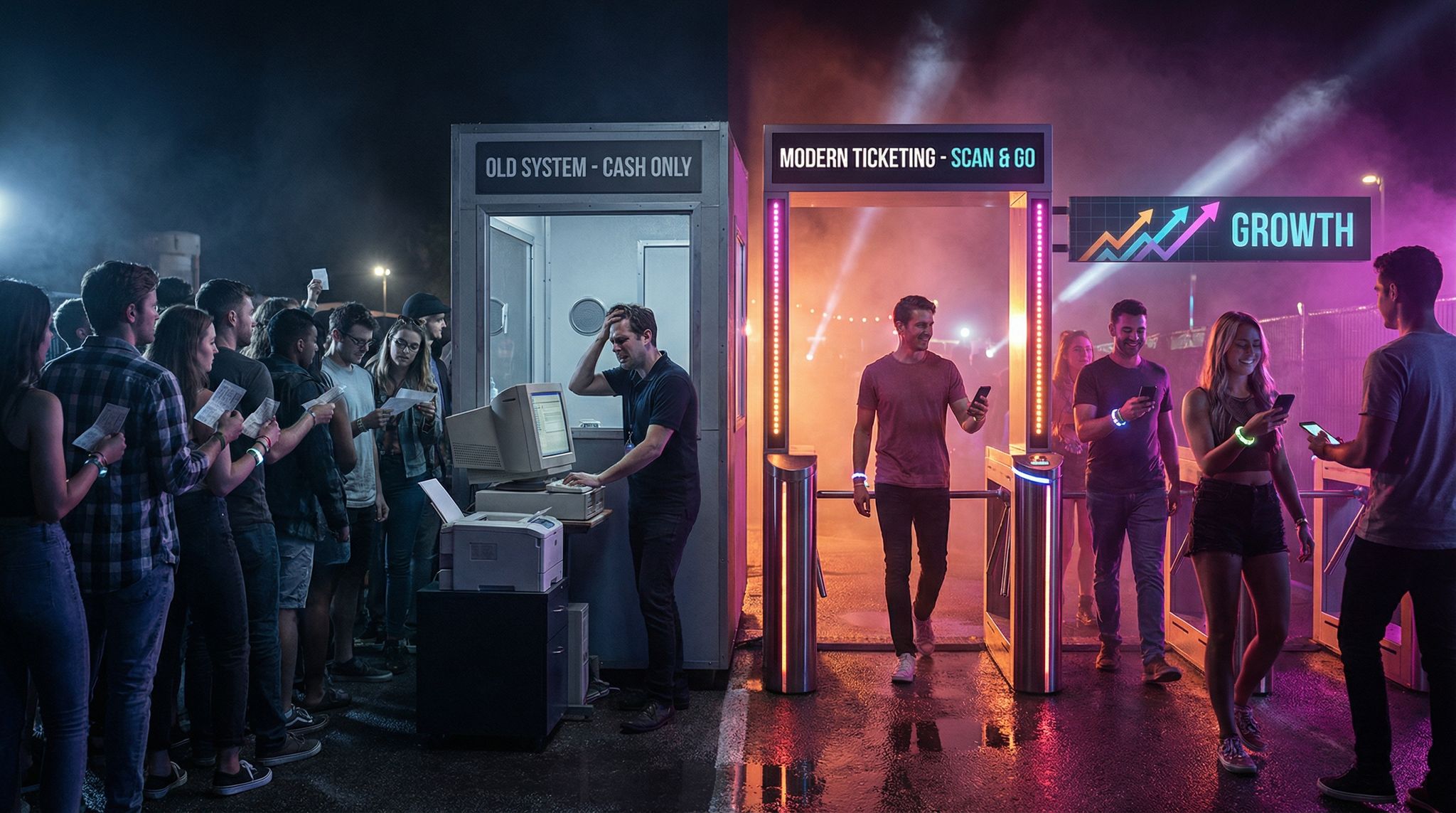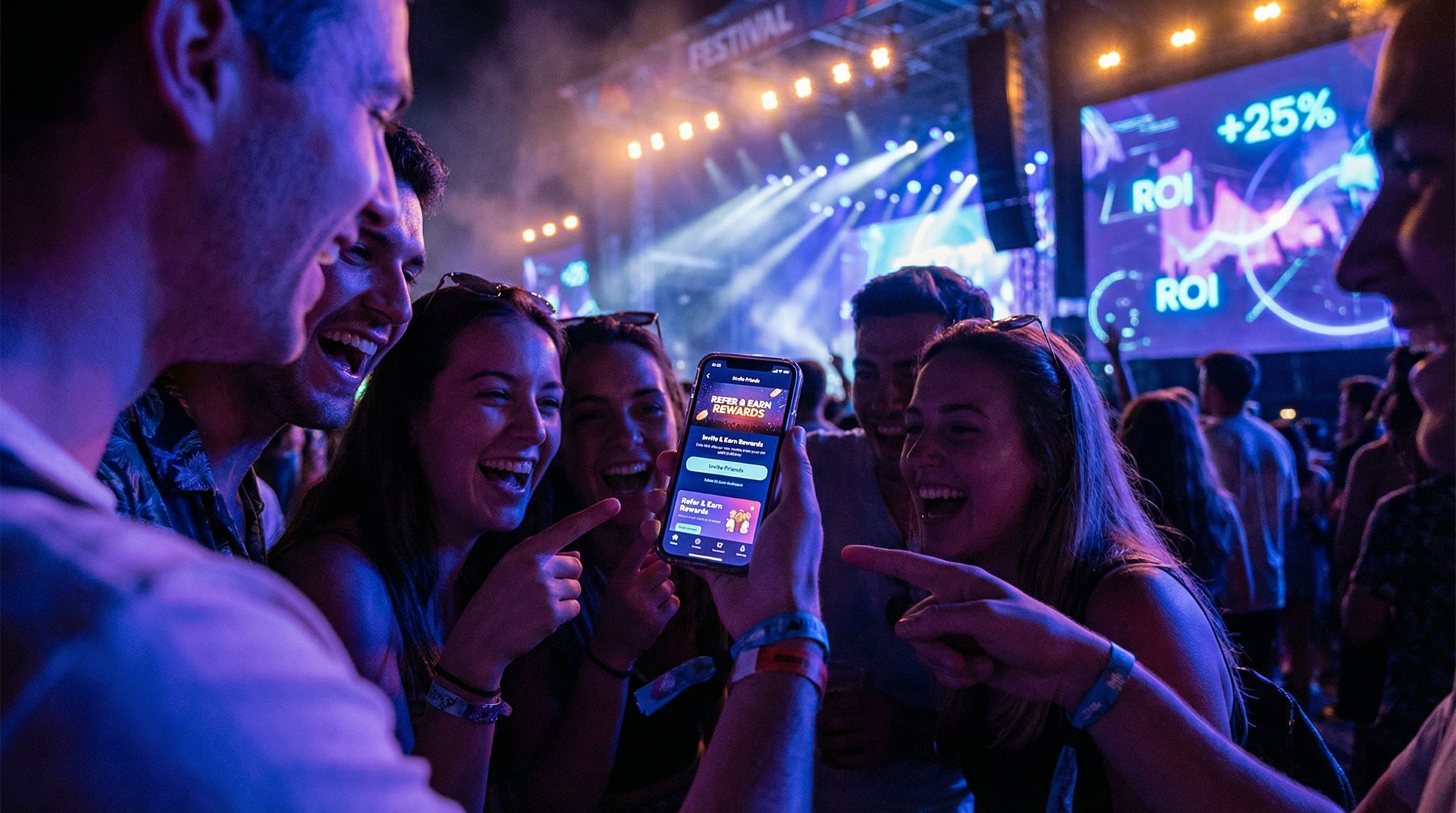Introduction
Negotiating a festival ticketing contract is one of the most critical deals a festival producer will make. The right ticketing partnership can boost your event’s revenue, streamline admissions, and provide valuable data for marketing. A bad deal, however, can saddle you with excessive fees, lack of control over attendee information, and inflexible terms that choke your festival’s growth. This guide offers practical, experience-backed advice on how festival organisers worldwide can secure the best terms on fees, data, and flexibility when signing with a ticketing platform. From lowering service charges to ensuring you own your customer data and have escape clauses, these insights will help you form a ticketing agreement that truly supports your event’s success.
Understanding the Stakes in Ticketing Contracts
A ticketing platform isn’t just a vendor – it’s a gateway to your festival’s audience and cash flow. The contract you sign with a ticketing provider governs not only service fees and payouts, but also who controls precious attendee data and how adaptable your ticketing setup is to change. Many festivals have learned the hard way that signing a boilerplate agreement without negotiation can lead to:
- High fees that bite into profits: Standard contracts might impose steep service charges or revenue splits that add up to tens or hundreds of thousands of dollars lost for larger festivals.
- Loss of attendee data control: Some platforms consider ticket buyers their customers, limiting festivals’ access to emails, contact info, and analytics needed for future marketing.
- Rigid terms and lock-ins: Multi-year exclusivity can lock you in with a provider even if their tech or service falls short, while lack of cancellation clauses leaves you stranded during crises.
By understanding these stakes, a festival producer – whether running a 2,000-person foodie event or a 200,000-strong music mega-festival – can approach contract talks with clear priorities. The goal is to craft an agreement that balances fair financial terms, data access, and flexibility for whatever lies ahead.
Key Contract Components to Negotiate
When reviewing a ticketing services agreement, pay special attention to clauses that will directly impact your festival’s finances, operations, and long-term strategy. Here are the key components to prioritize and how to secure favourable terms for each:
No Hidden Fees, Just Honest Pricing
One all-inclusive fee covers the platform, payment processing, support, and every feature. Free events are always free. No setup costs, no surprises.
Service Fees and Revenue Sharing
Service fees (also called booking fees or ticketing fees) are the charges added on top of the ticket price. Some providers simply pass these fees onto the buyer; others allow the festival to absorb or split them. Either way, they affect your ticket sales and attendee satisfaction. Negotiating lower fees or a better revenue share on fees can significantly boost your bottom line:
- Understand the industry baseline: Research typical fees in your region and genre. For instance, many general ticketing platforms charge around 5-10% of the ticket price plus a fixed $1–$4 per ticket. Major ticketing companies sometimes go even higher, especially for premium events. If your festival is high-volume, you have leverage to push for a lower percentage.
- Ask for volume-based tiers: If you expect growth or have multiple events, negotiate a fee structure that gets cheaper as you sell more tickets. For example, a provider might agree to drop their fee from 8% to 5% after 50,000 tickets sold, incentivising them to help you scale.
- Consider revenue share deals: In some cases, you can secure a share of the service fee revenue. Large festivals or multi-event organisers have negotiated to receive a portion of the booking fees back to the event. If your festival brings significant business to the ticketing company, ask if they’re willing to share a cut of those fees with you.
- Watch out for hidden costs: Clarify who covers credit card processing fees, chargebacks, and taxes. Sometimes a “low” service fee doesn’t include payment processing, which can add ~3% more. Ensure the contract spells out all charges so you’re not surprised later. Full financial transparency is a must – you should be able to track every dollar from ticket buyer to festival bank account.
Example: A mid-sized EDM festival in Australia negotiated its ticket provider’s fee down by offering a multi-year commitment. By agreeing to stay with the platform for three years, the festival locked in a lower per-ticket fee and even earned a small rebate on each ticket sold. This saved attendees money on checkout and returned tens of thousands in additional revenue to the festival over the contract term. The key was demonstrating the long-term value of the festival’s business to the provider to gain concessions.
Planning a Festival?
Ticket Fairy's festival ticketing platform handles multi-day passes, RFID wristbands, and complex festival operations.
Attendee Data Access and Ownership
In the digital age, attendee data is gold. Email addresses, demographics, zip codes, purchase histories – this information fuels a festival’s marketing and growth. Yet, not all ticketing companies let you fully access or own this data. Some large platforms operate as data controllers who treat ticket buyers as their customers. As highlighted in discussions on who owns your event data, this means you might only get limited access to contact info or may be restricted in how you use it. Negotiating strong data rights is therefore essential:
- Insist on data ownership or joint ownership: Your contract should explicitly state that your festival owns (or at least has perpetual rights to use) all attendee data collected through ticket sales. This includes names, emails, phone numbers, and any survey or add-on data collected at checkout. Avoid agreements that frame the platform as the exclusive owner of customer data.
- Ensure full data access: You’ll want on-demand access to your ticket buyer list and sales reports. Ideally, the platform’s system should let you export attendee data easily at any time. If a provider only delivers data in periodic reports or masks contact info, that’s a red flag. Clarify in the contract that data will be provided in a usable format (CSV, etc.) whenever requested.
- Protect privacy and compliance: While owning the data, you also need to handle it responsibly. A good ticketing contract will align with privacy laws (GDPR, CCPA, etc.), typically stating that data will be used in accordance with privacy policies and only for the festival’s purposes. Make sure the platform isn’t going to spam your attendees with unrelated offers – or if they do send marketing on your behalf, you have control over the messaging.
- Leverage data for marketing: Having attendee data unlocks marketing opportunities like launching loyalty programmes, doing targeted email campaigns, or offering alumni discounts for next year. For example, a wine festival in California made sure their ticketing deal guaranteed data access, which allowed them to analyse attendee zip codes and target advertising to nearby high-interest cities. The result was a 15% boost in out-of-town ticket sales the following year, driven by owning and using their data effectively.
Payout Schedules and Cash Flow
For many festivals, ticket revenue is the lifeblood funding pre-event expenses. However, it’s common for ticketing companies to hold funds until after the event or only pay in installments. Negotiating a payout schedule that aligns with your cash flow needs can literally keep the lights on:
- Know the standard terms: Many ticketing platforms only release funds after the event by default, with payouts sent a few days post-festival. While some providers allow scheduled pre-event payouts or advances on a case-by-case basis, getting early access to ticket revenue often requires negotiation or a proven track record. Many traditional ticketing contracts similarly pay out post-event to safeguard against cancellations. This means if you start selling tickets months in advance, that money sits with the ticketing company – not in your bank account.
- Negotiate progressive payouts: Aim to get a portion of sales delivered on a regular schedule leading up to the event, such as monthly or when certain sales milestones are hit. For instance, you might negotiate 50% of funds released when early bird sales end, another 30% a month before the festival, and the remaining after the event. This staged payout helps cover production costs in real time.
- Request a reserve holdback if needed: Ticketing providers worry about covering refunds if an event is cancelled, which is why they hold funds. A compromise is to allow a small percentage (e.g. 10-15%) to be held in reserve until after the event, but get the rest earlier. That reserve protects the platform and fans, while most of your cash isn’t tied up.
- Ensure transparency in accounting: The contract should require clear reporting of tickets sold and funds collected, as well as any fees deducted. The best practice is to have an online dashboard where you can see ticket revenue in real time. Some festivals even negotiate for the right to audit the ticketing company’s sales records if discrepancies arise – a reasonable ask for large events handling millions of dollars.
Case Study: During the lead-up to a major UK music festival, the organisers realised they would struggle to pay staging and artist deposits because their ticketing contract only paid out after the festival. They renegotiated with the ticketing provider to implement monthly payouts of a portion of ticket sales. With cash flowing in regularly, the festival paid suppliers on time and avoided high-interest loans. The ticketing company held back 15% as a contingency until after the event, which was released once the festival successfully took place. This arrangement balanced risk and cash flow needs for both parties.
Flexible Terms and Escape Clauses
The live events landscape can change rapidly – as seen with sudden weather disasters, pandemics, or shifts in technology. Locking your festival into a rigid, long-term ticketing agreement without flexibility can hinder your ability to adapt. Here’s how to build in terms that keep your ticketing future adaptable:
Data-Driven Event Marketing
Track ticket sales, demographics, marketing ROI, and social reach in real time. Exportable reports give you the insights to make smarter decisions.
- Contract length and renewal: Carefully consider the term of your ticketing contract. A multi-year deal can yield better pricing or perks, but ensure it’s not one-sided. If you commit to 3 years exclusive with a provider, negotiate an out-clause or performance review each year. For example, if certain sales targets or service levels aren’t met, you should have the option to exit early without penalties.
- Escape clauses: Include specific conditions under which you or the provider can terminate the contract. Common escape clauses cover things like bankruptcy of the provider, sustained technical failures, or failure to deliver agreed features. Also, if your festival is cancelled or postponed (e.g. due to a force majeure event like a pandemic or natural disaster), the contract should allow you to cancel the ticketing agreement or at least not lock you in that year. This was a painful lesson in 2020 for festivals that had multi-year deals but no pandemic clause – some were stuck or had to pay fees to break contracts.
- Service Level Agreements (SLAs): To ensure the ticketing service performs as promised, negotiate SLAs into the contract. This could cover system uptime (e.g. “99.9% uptime during on-sale periods”), maximum queue/wait times at peak entry, issue response times, and on-site support. Holding the provider to performance standards means they are contractually obligated to support your event’s success. One Day of the Dead cultural festival in Mexico even set an SLA that no attendee should wait more than 15 minutes to enter at peak times. As detailed in a case study on procurement at scale for festivals, the ticketing and entry provider had to deploy additional scanners and staff to meet this goal, resulting in smooth admissions and happy crowds.
- Technology and feature flexibility: Ensure the contract doesn’t tie your hands on new tech. If a ticketing provider insists on using only their scanners or software, consider what happens if you want RFID wristbands, facial recognition entry, or integration with a new festival app in future years. Try to include language that the provider will support reasonable new requirements or integrations, or at least discuss how those can be accommodated. A forward-looking ticketing partner will be open to innovation as your festival grows.
Support, Training, and Partnership
Beyond the core terms of money and data, a good ticketing contract should lay the foundation for a true partnership. You want a provider that will be there when you need help and that actively contributes to your festival’s success. Key points to negotiate include:
- Onboarding and training: If your team or volunteers will use the ticketing system for door entry or customer service, the contract can include training sessions or documentation. Many providers offer free webinars or even on-site training for big events – don’t hesitate to ask for it.
- Dedicated account support: Insist on a named account manager or support team who understands your event. When ticket sales are live or the festival is happening, you need quick responses. The contract can specify support availability (e.g. 24/7 phone support during event days) or even on-site presence for larger festivals. Some festivals negotiate to have a tech support rep on site on show day as part of the deal.
- Marketing and promotion help: Ticketing platforms benefit from your success (more ticket sales = more fees for them), so see if they will assist in promoting the event. This could be spotlights on their website, inclusion in email newsletters, or social media pushes. While not every platform will offer this, a bit of co-marketing can be a nice bonus and is worth discussing in negotiations.
- Contingency plans: Discuss how the ticketing provider will handle worst-case scenarios. If the ticketing site goes down during an on-sale, do they have a backup site or queueing system? If scanners fail at the gate, will they have spares or a manual check-in list as fallback? Outline these contingency responsibilities in the contract. It’s better to have a plan and never need it than to face chaos with no agreed procedure. High-profile ticketing failures have happened – from servers crashing during a big artist on-sale to entire platforms going dark due to hacks – so wise festival organisers prepare for the unexpected.
Strategies for Successful Negotiation
Approaching a ticketing contract negotiation with a clear strategy can tip the scales in your favour. Here are proven tactics for festival organisers when sitting at the table with ticketing companies:
Need Festival Funding?
Get the capital you need to book headliners, secure venues, and scale your festival production.
Do Your Homework and Compare Options
Knowledge is power. Before negotiating, research at least 2-3 ticketing providers to compare their fees, features, and reputation:
- Gather proposals: If possible, get quotes or proposals from multiple platforms. Knowing that another company is willing to charge a 5% fee with weekly payouts gives you leverage to ask your preferred provider to match or beat terms.
- Learn from peers: Talk to other festival producers (at conferences or informal networks) about which ticketing companies they use and what deals they’ve gotten. If a similar festival in New Zealand secured full data ownership and a 4% fee, use that intel in your negotiation, without naming names.
- Prioritize your needs: Decide what matters most – lowest fees, getting advances on revenue, top-notch tech features, data access, marketing support, etc. Rank these priorities because you may need to trade less critical ones to secure your top terms.
- Initiate early: Begin contract discussions well before your current ticketing term ends or before you plan to launch ticket sales. A rushed negotiation tends to favor the provider. Starting early lets you walk away and switch if talks aren’t going well.
Leverage Your Event’s Value
Remember that ticketing providers need successful events as much as events need ticketing. Highlight what your festival brings to the table:
- Volume and growth: If you have a history of selling out or strong year-on-year growth, emphasize that. Providers may lower fees if they believe your festival will grow significantly over the contract term (meaning more tickets for them to process).
- Audience demographics: If your festival attracts a coveted demographic (say, tech-savvy young adults or high-spending wine enthusiasts), mention this. Ticketing companies might see extra value in your audience for future marketing or prestige, making them more flexible on terms.
- Brand and prestige: A well-known festival can be a trophy client for a ticketing platform to tout. Even smaller niche festivals might be regionally famous or have cultural cachet. Don’t shy away from selling the uniqueness and loyalty of your fan base.
- Multiple events potential: If you run more than one event (or plan to), mention the possibility of giving the ticketing partner more of your business. A bundle deal covering several festivals or a tour can win better pricing overall.
Be Willing to Walk (and Have a Backup)
Negotiation 101: you need the ability to say “no deal” to get a good deal. Prepare a fallback so you don’t feel pressured into bad terms:
- Identify a backup platform: Even if you have a preferred provider, have at least one viable alternative in mind. This might be another major ticketing company or a newer tech-savvy platform like Ticket Fairy that promises lower fees and richer data insights. Knowing you have somewhere else to go gives you confidence in negotiations.
- Set your red lines: Know your non-negotiables – e.g. “If they won’t let us own our customer list, we walk.” If the negotiation isn’t meeting your critical needs and the provider won’t budge, be ready to politely break off. Sometimes, walking away (or appearing ready to) can prompt a last-minute concession from the provider.
- Get terms in writing: If a salesperson makes a verbal promise (“we’ll give you VIP support” or “we’ll integrate that new RFID system by next year”), insist it be added to the contract. If they hesitate to formalize a promise, that’s a sign it may not materialize. It’s better to have everything documented – a contract is your safety net if staff change or memories fade by next festival.
Focus on a Win-Win Outcome
Aim for a contractual partnership where both sides feel invested in the festival’s success:
- Performance incentives: Consider including incentives for the ticketing company. For example, if they help you sell out faster or exceed certain sales targets through their marketing, perhaps they get a small bonus or an extension on the contract. This way, they have skin in the game to perform well beyond just collecting fees.
- Open communication: Negotiate a clause about regular check-ins or post-event reviews with the provider. A yearly or post-festival performance review meeting can be baked into the deal, ensuring that any issues are discussed and addressed for next time. This establishes a culture of continuous improvement.
- Flexibility for new ideas: If you come up with a novel ticketing idea (like a two-for-one flash sale or a late release VIP upgrade), the contract shouldn’t prevent it. Collaborate with the provider during negotiations to include a general understanding that both parties will be flexible and work in good faith to implement new sales strategies. After all, a sold ticket benefits everyone.
Real-World Insight: Several independent festivals in Europe formed a consortium to approach ticketing companies together, using their collective volume as leverage. By negotiating as a bloc for tens of thousands of tickets across multiple events, they secured ultra-competitive fee rates and a promise of custom development work to create new features they wanted. This win-win mindset – treating the negotiation not as a zero-sum fight but as building a partnership – led the ticketing provider to invest extra resources, knowing they’d gain loyal clients and a larger user base.
Avoiding Common Pitfalls
Even seasoned festival organisers can make mistakes in ticketing deals. Here are some frequent pitfalls and how to steer clear of them:
- Signing without competitive bids: Going with the first ticketing platform you talk to, without comparing alternatives, can mean leaving money or features on the table. Always explore a few options – even if you end up sticking with your first choice, you’ll be armed with knowledge to negotiate better terms.
- Ignoring the fine print: Details like automatic renewal clauses, exclusivity, or jurisdiction (which country/state’s law governs the contract) may seem tedious but can have big consequences. For example, an automatic renewal could lock you in for an extra year unless you cancel far in advance. Review these clauses carefully or have a lawyer do so.
- Overlooking consumer experience: Remember that high service fees or clunky ticketing processes directly impact your fans. Weigh the benefit of, say, a slightly lower fee versus the platform’s reputation among ticket buyers. Some popular platforms have frustrated fans with surprise “dynamic pricing” that skyrockets ticket costs upon high demand. Recent controversies regarding dynamic pricing strategies that angered fans highlight how such practices can hurt your festival’s relationship with its audience. Ensure the chosen platform aligns with your values on customer-friendly policies (for instance, Ticket Fairy explicitly avoids dynamic pricing to keep pricing fair and transparent).
- Not securing data for the future: Imagine switching ticketing companies and not being able to email last year’s attendees because the old provider kept those emails. It happens. Make sure your contract lets you retain a copy of all customer contact info and purchase history when the agreement ends. Ideally, do a full data export after each event just to have your own backup.
- Forgetting contingency planning: Don’t assume everything will go perfectly. If the ticketing website crashes during your sale, do you have a way to communicate with buyers or an alternate sales method ready? If a virus outbreak forces you to refund tickets, who eats the credit card processing fees – you or the ticketing company? Discuss these scenarios during negotiation and get agreement on how they’ll be handled, so you aren’t scrambling later.





